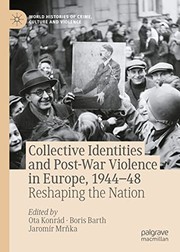- Summary
- This book analyses the process of reshaping liberated societies in post-1945 Europe. Post-war societies tried to solve three main questions immediately after the dark times of occupation: Who could be considered a patriot and a valuable member of the respective national community? How could relations between men and women be (re-)established? How could the respective society strengthen national cohesion? Violence in rather different forms appeared to be a powerful tool for such a complex reshaping of societies. The chapters are based on present primary research about specific cases and consider the different political, mental, and cultural developments in various nation-states between 1944 and 1948. Examples from Italy, France, Norway, Denmark, Greece, Ukraine, Lithuania, Belarus, Czechoslovakia, and Hungary demonstrate a new comparative and fascinating picture of post-war Europe. This perspective overcomes the notorious East-West dividing line, without covering the manifold differences between individual European countries. Ota Konrad is Associate Professor of Modern History at Charles University in Prague, Czech Republic. He has worked on topics dealing with the history of East-Central Europe in the twentieth century. Recently, he co-edited In the Shadow of the Great War: Physical Violence in East-Central Europe, 1917-1923 (2021). Boris Barth is Professor of Modern and Contemporary History at Charles University in Prague, Czech Republic. His publications include Europa nach dem Groen Krieg. Die Krise der Demokratie in der Zwischenkriegszeit 1918-1938 (2016) and Civilizing Missions in the Twentieth Century (edited with Rolf Hobson, 2020). Jaromir Mrnka is Researcher at the Institute for the Study of Totalitarian Regimes, and Junior Research Fellow at Charles University in Prague, Czech Republic. He has studied the social mechanisms of denunciation, collective violence, and conflict-related acts of sexual violence in the Czech Lands during the Second World War and its aftermath.
- Series
- World histories of crime, culture and violence
World histories of crime, culture and violence.
- Format
- Book
- Published
- Cham : Palgrave Macmillan, an imprint of Springer Nature Switzerland AG, [2022]
- Locale
- Europe
- Contents
-
PART I. RESHAPING THE NATION
Introduction; Ota Konrad, Boris Barth, Jaromir Mrnka
The End of the War and the Beginning of the Peace: Where Violence Leaves Off and Reconstruction Begins: Continental Europe, 1944-1947; Norman Naimark
PART II. JUSTICE
Redefining National Identities through Justice: A Comparative Analysis of Italy and France; Barbara De Luna and Greta Fedele
Purges, Patriotism, and Political Violence: The Danish Case, 1944-1945; Henrik Lundtofte
'Mentalities of War, Mentalities of Peace': Capital Punishment in the Norwegian Treason Trials, 1941-1948; Anika Seemann
PART III. GENDER
'German Brats and Tarts': Gender, Sexuality, and Collective Memory in Post-War Norway; Caroline Nilsen
Gender, Ethnicity, and Multidirectional Violence during the Last Months of German Rule in Lithuania: A Case Study of Local Force Battalions; Justina Smalkyte
PART IV. NATION AND NATIONALISM
Assessing National 'Consciousness': The Belarusian Home Guard, 1944-1945; Aleksandra Pomiecko
Cleansing Greece of the Miasma of its 'Sudeten': Macedonian Slavs as an Unwanted Minority in the Aftermath of the Second World War; Tasos Kostopoulos
Between Nation and Religion: Czech Protestants and the Transfer of the Sudeten Germans, 1945-1948; Ondrej Matejka
PART V. CITIZENSHIP
'Pure Christians' vs. 'Working Citizens of the Democratic Era': How the Claimants of Jewish Property perceived Citizenship in Hungary; Borbala Klacsmann
A Glass Half Full or Half Empty? The Postwar Treatment of the German Minority in Denmark; Peter Thaler
PART VI. CONCLUSION
Conclusion; Christoph Cornelien.
- Other Authors/Editors
- Konrád, Ota, 1973- editor.
Barth, Boris, editor.
Mrňka, Jaromír, editor.
- Notes
-
Includes bibliographical references and indexes.
PART I. RESHAPING THE NATION -- Introduction; Ota Konrad, Boris Barth, Jaromir Mrnka -- The End of the War and the Beginning of the Peace: Where Violence Leaves Off and Reconstruction Begins: Continental Europe, 1944-1947; Norman Naimark -- PART II. JUSTICE -- Redefining National Identities through Justice: A Comparative Analysis of Italy and France; Barbara De Luna and Greta Fedele -- Purges, Patriotism, and Political Violence: The Danish Case, 1944-1945; Henrik Lundtofte -- 'Mentalities of War, Mentalities of Peace': Capital Punishment in the Norwegian Treason Trials, 1941-1948; Anika Seemann -- PART III. GENDER -- 'German Brats and Tarts': Gender, Sexuality, and Collective Memory in Post-War Norway; Caroline Nilsen -- Gender, Ethnicity, and Multidirectional Violence during the Last Months of German Rule in Lithuania: A Case Study of Local Force Battalions; Justina Smalkyte -- PART IV. NATION AND NATIONALISM -- Assessing National 'Consciousness': The Belarusian Home Guard, 1944-1945; Aleksandra Pomiecko -- Cleansing Greece of the Miasma of its 'Sudeten': Macedonian Slavs as an Unwanted Minority in the Aftermath of the Second World War; Tasos Kostopoulos -- Between Nation and Religion: Czech Protestants and the Transfer of the Sudeten Germans, 1945-1948; Ondrej Matejka -- PART V. CITIZENSHIP -- 'Pure Christians' vs. 'Working Citizens of the Democratic Era': How the Claimants of Jewish Property perceived Citizenship in Hungary; Borbala Klacsmann -- A Glass Half Full or Half Empty? The Postwar Treatment of the German Minority in Denmark; Peter Thaler -- PART VI. CONCLUSION -- Conclusion; Christoph Cornelien.




